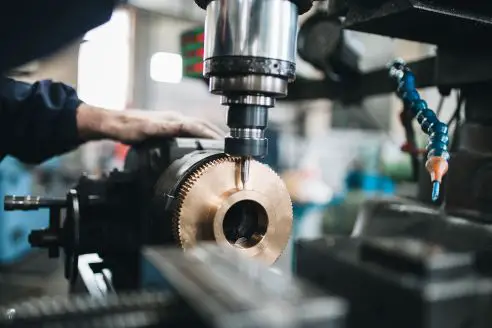
CommonCentsMom.com is advertiser-supported: we may earn compensation from the products and offers mentioned in this article. However, any expressed opinions are our own and aren't influenced by compensation. The contents of the CommonCentsMom.com website, such as text, graphics, images, and other material contained on this site (“Content”) are for informational purposes only. The Content is not intended to be a substitute for professional financial or legal advice. Always seek the advice of your Financial Advisor, CPA and Lawyer with any questions you may have regarding your situation. Never disregard professional advice or delay in seeking it because of something you have read on this website!
Industrial machinery components are used in the production of various products, mainly found in the engineering, construction, chemical, and pharmaceutical industries. Industrial screws, nuts and bolts, pipe fittings, and nuts are the most commonly used machinery parts. Industrial screws are known as machine screws, or nuts, and bolts are known as bolts or screw nuts.
The demand for these products is rising due to their increased usage in various industries. It has become an important part of the economy due to its applications in several sectors such as transportation, manufacturing and construction.
It also includes some important sub-sectors, such as pharmaceuticals and military sectors, where it is used for different purposes. In addition, other related job roles include sales representatives working at various retail outlets to sell these products to customers. Some of the jobs related to this are listed below:
Human Resources Managers
A Human Resources Manager is the person who directs the entire people department in an organization. Establish policies that will help you manage and select employees to resign, manage their compensation and benefits and enforce laws that protect their health and safety.
Assemblers and Fabricators
Assemblers, fabricators, welders, and machine operators in this kind of industry are primarily involved in producing and distributing metal and plastic parts for machinery use. It may be necessary to glue or join pieces by welding, soldering, or using other techniques to fix them. Assemblers, fabricators, and welders assemble products in factories or large-scale plants.
Assembly Line Worker
Production line workers perform many tasks to help people gather materials to make products. Workers in assembly lines are employed in manufacturing factories to put together products. They are paid an hour to work to have a comfortable lifestyle. Workers attach parts to products in factories, test products, or pack products that are being shipped. Workers on assembly lines may be charged with operating machinery used in assembly.
Heavy Equipment Mechanics
Heavy Equipment Mechanics are very important in the machinery component industries. They have excellent knowledge about the main parts and systems of the machines they work on. They are also skilled in driving a tractor and other farm machinery and have great experience in welding and cutting metal. They have good skills in welding, cutting, and metalworking, and they are also good at using computer software to do some basic computer knowledge.
Automotive Controllers
This position requires individuals with excellent knowledge of accounting, management and payroll responsibilities. These employees work on generating budgets for manufacturing plants and supervise the production of asset reports for those plants. It is easy to become an automotive controller in TV shops and car dealers. You will be earning very nice money from doing that.
Mechanical Engineer
These engineers drive the whole industry of manufacturing machine components. The engineers build power-generating machinery, and other engines and are responsible for designing everything that makes electricity, including generators, engines, elevators, and escalators.
Industrial Designers
Designers create and produce designs that are innovative and very talented. They design products for people who want to buy, sell, or distribute them. Designers in industries like metallurgical engineering and machinery designs try to convince consumers that their product is attractive and functional; thus, we can judge whether a design is good.
Construction Managers
As Construction Managers, they supervise construction projects. They commanded the operators who controlled the moving parts of the equipment installed in buildings. They might work with telecommunications or other technical equipment, or they might work with other professionals in construction and transportation.

Automation Engineers
In addition to designing and testing automated systems, they also serve in factories that make cars and other cars and food processing plants. The job of an automation engineer is often challenging but very rewarding. There are many career opportunities for automation engineers. You will therefore require a college degree in Computer Science or Software Engineering to be an automation engineer.
Instrumentation Engineers
Engineers at Instrumentation companies build, test and analyze instruments, controls and other components that enable machines to perform certain functions. Instrumentation engineers can also rewrite or upgrade older systems that allow you to manipulate electrical or other machines. Instrumentation Engineers are very skilled in measuring, designing, and making prototypes. They are great at troubleshooting and component installation. Instrumentation engineers are good at designing and creating prototypes, analyzing data, and installing components. For engineers to become instrumentation engineers for machinery components, they need a bachelor’s degree in engineering technology or a mathematical-related field.
Sales Manager
A Sales Manager in the Industrial Machinery/Component sales department manages sales teams representing companies selling industrial machinery and components. They plan and implement sales plans and sales targets, as well as manage the sales team. They also work with various departments and industry associations to ensure the products and services they sell are up to scratch.
Engineering Manager
Engineers and managers plan, direct and coordinate the activities of various companies related to the performance of their scientific and technological activities. Engineers help organizations plan and control the budgets for engineering projects and plan the timelines that will be responsible for the construction of those projects. The Engineering Manager must coordinate with all departments in order to meet the company’s objectives.
Accountant and Auditor
Almost all of the accountants and auditor specialists working in this industry are employed in big firms which can offer various kinds of services to their clients. Some of these professionals also have jobs at small accounting firms specializing in working with clients in the industrial machinery/components sector. In both cases, these individuals do a number of different types of work, which may include analyzing records to determine whether a company complies with its tax obligations and giving advice on tax issues.
Purchasing Manager
Managers of purchasing departments in industries such as machinery/component production are generally tasked with a broad range of tasks, from arranging for new orders to arranging for contracts and creating procurement strategies to supervising supplier relationships and reducing risks. They should be able to understand what products or services they are looking for and to locate the most cost-efficient suppliers. Purchasing directors need to be skilled managers who can predict and control risks that may arise from insufficient supplies or price fluctuations.
It is good to start by finding a job in an industrial machine in the city where you are staying. This will be helpful as you would be able to move with ease in your country and there would not be any problem with transportation and other expenses. The only problem would be the job, as there are many jobs in industrial machines and finding a good one can be a bit tough. However, you will have to start looking for one as looking for a good job is important.
In conclusion, the industrial machinery component industry offers various job opportunities across various sectors, such as engineering, construction, chemical, and pharmaceuticals. From human resources managers to mechanical engineers, various roles are available for individuals with different skill sets and educational backgrounds. The increasing demand for industrial machinery components makes it a crucial part of the economy and offers stable employment opportunities. Job seekers can explore different roles and gain expertise in the field to advance their careers and contribute to the industry’s growth.







